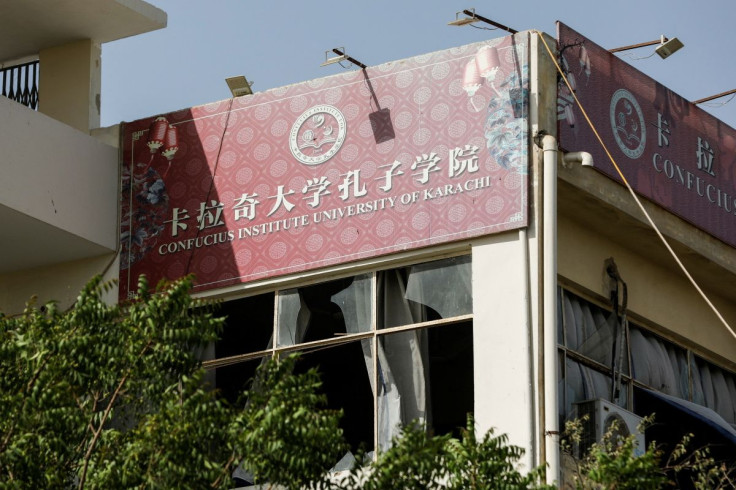China’s Go Global Plans Met With Resistance In Pakistan

Chinese efforts to make Pakistan a client state are not finding favor with all people in the country, who have started to target Chinese projects and its nationals to prevent Islamabad from serving as a gateway to further China's go global plans.
All-weather ally China has poured billions into Pakistan and thousands of Chinese nationals frequent the Islamic Republic to work on infrastructure projects or other business ventures and as part of people-to-people contact. Though Islamabad is hell bend on ensuring nothing happens to jeopardize the economic and social bonhomie, things are not looking rosy if the April 26 suicide attack on Chinese language teachers in Pakistan is any indication.
Besides being active in Pakistan with its cultural diplomacy of people-to-people contact, China has already made its presence felt in Pakistan with large infrastructure projects across the country, including resource-rich southwestern Balochistan province, and Chinese nationals are present everywhere to work on them.
As a matter of policy, Pakistan, well-known for its instability, economic underdevelopment and conflict, has taken special steps to closely guard the interests of China and its men in Pakistan.
Measuring around 3000 kms and slated for completion by 2030, the $65 billion China-Pakistan Economic Corridor (CPEC), a network of roads, railways and pipelines, starts from the Muslim-dominated north-western Chinese province of Xinjiang to end in the Pakistani port city of Gwadar in Balochistan province. Beijing is concerned that economic underdevelopment and instability in Pakistan can undermine security on China's northwest flank and has made commitments to provide around $46 billion in development deals, which roughly comes to 20 percent of Pakistan's annual GDP.
Beijing also fears the collaboration between Pakistan Taliban, a jihadist outfit active in the country, and ethnic minority Uyghur Muslims, who have charged China with human rights violations.
With these projects, China is looking for direct access to the Indian Ocean and beyond to boost its influence in Central and South Asia. For Pakistan, Chinese investments are a durable solution to the endemic energy crisis and dilapidated power infrastructure. Through coal, nuclear and renewable energy projects, Chinese investments will add 10,400 megawatts to Pakistan's energy grid.
China's huge investment projects and Chinese nationals roaming in Pakistani streets are mistrusted by some in Pakistan who allege that the benefits do not percolate down. They attack Chinese projects and workers despite Pakistan's decision to protect the Chinese projects and nationals.
However, none of the incidents has been large enough in scale to threaten the Chinese investment and Chinese nationals' presence in the country which Beijing is spearheading as part of its Go Global initiative, started in 2001.
But the April 26 suicide attack on Chinese language teachers, triggered by a suspected female suicide bomber, is one of the most prominent attacks to date and is the first major attack this year. The incident poses a challenge to Pakistan's newly elected Prime Minister Shehbaz Sharif who came to power on April 10.
"I am deeply grieved on the loss of precious lives including of our Chinese friends in the heinous attack in Karachi today," Sharif said in a statement and promised a speedy probe.
The deceased Chinese nationals were among the passengers on a minibus returning to Karachi University. They were killed when the bomb exploded at the entrance to the university's Confucius Institute, which China has set up as part of its cultural diplomacy.
The Baloch Liberation Army (BLA), a separatist group based in Balochistan, a sparsely populated region bordering Afghanistan and Iran, claimed responsibility for the blast. Saying locals do not benefit, the group opposes Chinese investment in Pakistan and Balochistan.
People in Balochistan have also taken to the street to air their grievances against the increased presence in Pakistan's one of the least developed regions.
The BLA, who say they are fighting for a greater share in regional resources, has targeted Chinese nationals earlier on a number of occasions, as has the Pakistani Taliban, the domestic version of the Afghan Taliban.
In April last year, the Pakistani Taliban claimed responsibility for a suicide bombing at a luxury hotel in south-west Balochistan province when China's ambassador to Pakistan was in the hotel.
In July, a suicide bomber blew up a passenger bus in northern Pakistan, killing 13 people, including nine Chinese engineers working on a hydro-power plant. Initially, Pakistani Foreign Minister Shah Mehmood Qureshi said India had a role in the attack. However, later a cash-strapped Pakistan settled the case by paying $11.6 million in compensation.
Some of the Chinese nationals in Pakistan are accused of luring women with payments and promises of a good life in China. But these women face difficult living conditions, forced pregnancy and forced prostitution once they reached China. Pakistan initiated a probe into this human trafficking way back in 2019 and found that Pakistani girls are trafficked to China allegedly for organ removal and sexual exploitation.
A few Chinese nationals in Pakistan have been allegedly involved in fraudulent marriages with Pakistani women, mainly from marginalized Christian families, and some of them have been rounded up by police but went scot-free after the court decision.
In February this year, a Chinese man was arrested on a charge of raping a woman, and police seized arms and ammunition from the suspect's house. The man was even ready to convert in order to marry her, police said.
The attack on Chinese nationals in Pakistan came into the spotlight with gunmen killing four people after they targeted the Chinese consulate in the port city of Karachi in 2018.
Since a pro-U.S. government has taken charge in Pakistan in place of a pro-China government of Imran Khan, Chinese efforts to make Pakistan a showcase for other nations seeking to shift their influence away from the U.S. will not go down well with the Pakistani people who are already up in arms against the Chinese presence in the South Asian nation.
























